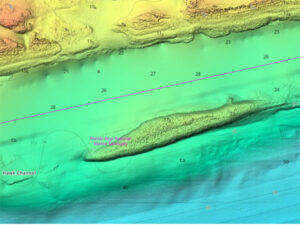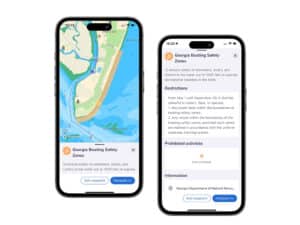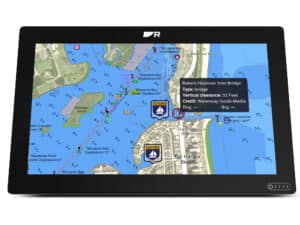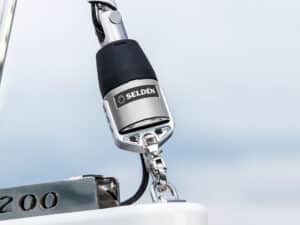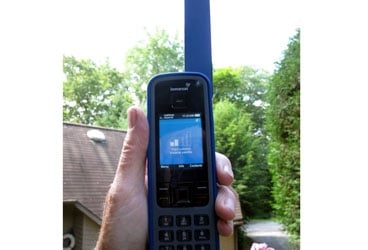
panbo 0818 reck 368
Maybe I’m missing something, but the Isatphone Pro seems every bit like the game changer that Inmarsat claimed it would be. I’ve made calls from the boat and backyard, sent myself text messages and emails and replied to them, but have yet to detect a performance issue. Plus I find the handset easy to use. And, mind you, this is a sat phone that’s only been shipping for a month or two, and it’s using an Inmarsat I-4 geosynchronous satellite orbiting about 22,000 miles over the equator at 98 degrees west Longitude. As the phone is telling me in the photo above, it does like to have its antenna aimed vaguely at the bird, and I’d guess that would be even truer if I moved farther north and/or east, thus putting more atmosphere between the phone and I-4 Americas. But consider that I’m at about 45 degrees north Latitude and 68 degrees west Longitude with a lot of trees around me, even to the southwest in the background (and that DirectTV couldn’t get a decent signal here, even on a roof higher than the one you see)…and here’s how I sound:
In fact, I talked with Charlie Doane for about 10 minutes last night from the same location, and it went very well, even when I tried swinging the phone around as though I were on a lurching vessel. I had earlier tried talking to myself via cell phone, and had heard a substantial delay — not surprising given maybe 50,000 miles of wireless transmission! — but Charlie and I didn’t step on each other. The good folks at the SatPhoneStore say that they still recommend Iridium if a user may be around mountains or other high obstructions, because its galaxy of low orbiting satellites handles those situations better, but they also said they’re selling every Isatphone Pro they get. The cost differential is pretty striking: $1,295 versus $595 for the handsets, and $40/month + $1.40/minute versus $15/month + $1/minute for minimum service. Note also that Inmarsat is offering some very attractive prepaid SIM cards — like 250 minutes for $200, good for two years, no monthly service charge — but you might also bridle like I did at the “Only available outside the U.S.” qualification. Well, no worries; I’m told that this is due to a technical or legal glitch that Inmarsat hopes to fix before the year is up. It really does seem like the cost of having a sat phone for those few times many cruising boats are beyond cellular just went down big time.
The Isatphone Pro will not yet serve as a (very) slow data modem, like an Iridium can, but when that feature is enabled in early 2011, I’ll bet it works smoothly. I say that because I easily loaded the phone’s USB drivers and even synced selected contact info from Outlook into it, and also because the text messaging and text email seemed to work well. Below you can see that it even has a helper window for keying in text (and it can also try to predict words, though that’s not actually shown here). I did not receive emails or texts to the phone until after it had been on the network for about 10 minutes, but I could get used to that..
The Isatphone Pro also has a built in GPS. In fact, it won’t connect to the network until it’s established a position, which can take some time, but then again you can easily send your position to someone, as seen below. It seems to me that once a marine docking station is real (soon, I’m told), it wouldn’t be that hard to create an auto tracking app. Heck, there’s already a firmware download tool on the Inmarsat site, along with the manuals. This isn’t a smart phone but I suspect it’s as close as a sat phone has ever come before. But I should test its performance more, especially in rain and fog, and in motion. It’s an awful long way to those I4 sats, and I notice that when I tested the Iridium 9555 last summer, it worked in Gizmo’s main cabin, where the Inmarsat phone doesn’t seem willing. I have little doubt, though, that a new phase in the sat coms horse race is ON.

